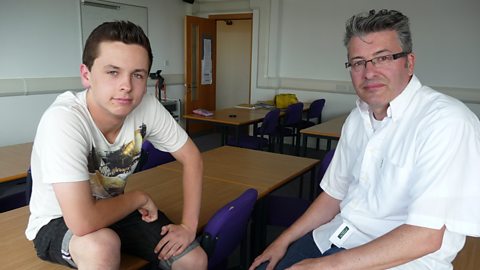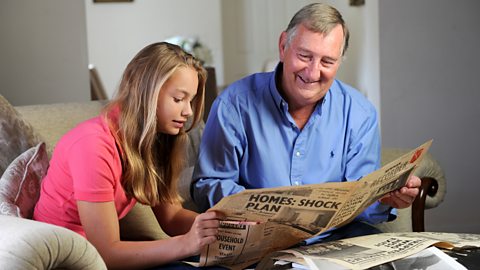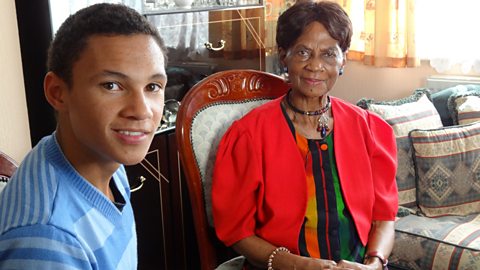REPORTER:'Women of nineteen fifty. What does It mean in twenty century Britain, to be a women? Can she develop her individual talents? Can she help to create the kind of society she wants?
REPORTER:'Or does she still look upon marriage as the sole purpose of her existence?'
NARRATOR:'After th1
SIXTIES STYLE MUSIC
REPORTER:'Women of nineteen fifty. What does It mean in twenty century Britain, to be a women? Can she develop her individual talents? Can she help to create the kind of society she wants?
REPORTER:'Or does she still look upon marriage as the sole purpose of her existence?'
NARRATOR:'After the war, the British economy required women to work in low and semi-skilled jobs. Due to the boom in British manufacturing.
NARRATOR:'However for most women in the 1950's the role of home maker and mother ranked higher than that of career women.
NARRATOR:'Amba's 15 and from Isleworth in West London.'
AMBA:I've learnt about women and what their lives were like during this period. But I'd like to know more about their work.
AMBA:I'd like to start by speaking to my great grandmother Bettie. About how she lived during this time.
JAZZ MUSIC
NARRATOR:'Bettie Dodd was born in 1921. She left school at 14 and worked almost continuously until she was 55. In two processed food factories.'
BETTIE:I was about 15.
AMBA:Oh my age?
BETTIE:Yeah about your age, yeah.
AMBA:Imagine me working in a factory?
BETTIE:Yeah, 15.
BETTIE:That’s where we done the cheeses, Little portions of cheeses.Oh and we done Salad Cream there as well. I forgot about that, we done Salad Cream.
BETTIE:Yeah you had to be very quick at it or the bottle used to break.
BETTIE:They're all friends there.
BETTIE:You got a little bit more money than what you did In the shop.
AMBA:What did you make in the Walls factory?
BETTIE:In Wall's we done sausages and bacon. Pies.
BETTIE:We weighed them and then scaled them, linked them.
BETTIE:Then wrapped them up.
NARRATOR:'When Bettie married at 17 in 1938, she continued to work full time.
NARRATOR:'She returned to work part time in 1947 when her son was five years old.'
BETTIE:We wanted things for the home so went to work to get little bit extra's for the home.
AMBA:What was the biggest thing that you bought with your money that you earned?
BETTIE:Well it was like washing machines and fridges and that. Because they were very expensive in those days.
BETTIE:They were like electric washing machine but then they had a ringer. And you had to ring that by hand. Then it goes in the sink and you had to rinse it, yeah.
BETTIE:We both sorta helped to pay for the car.
AMBA:Did you purchase it from high purchase?
BETTIE:No because we didn’t believe in…
BETTIE:Getting in debt.
BETTIE:So we used to save up and then buy it.
AMBA:Why did you choose to go part time?
BETTIE:Well it was handy for me.
BETTIE:Because him going to school and then I was home when he come home.
BETTIE:I didn’t want to work full time, it was too much.
BETTIE:Looking after a house and a family.
AMBA:Did you get paid the same as the men?
BETTIE:No.
BETTIE:Men got a little bit more than what women did.
AMBA:Did you think that was fair?
BETTIE:That was way it was in those days.
NARRATOR:'Amba wants to know how typical her nans experiences were.
NARRATOR:'And its meeting a specialist in women's studies. Dr Claire Langhamer.'
DR CLAIRE LANGHAMER:For most women the expectation was that they would work once they left school for a period of time.
DR CLAIRE LANGHAMER:But then they would marry, have a family and that would be their primary job.
DR CLAIRE LANGHAMER:So as you say your nan thinking that her job was being a housewife. Housewife and a mother.
DR CLAIRE LANGHAMER:I think that was the expectation and that, that doesn't mean that they didn’t work outside the home as your nans experience shows. But that, that was something they did to benefit the family.
NARRATOR:'Amba's interested to know about the challenges faced by women wanting a career.
NARRATOR:'So she's going to see 82 year old Patricia Barrett.
NARRATOR:'Who left school to work as a clerk in city bank. And chose not to marry.'
PATRICIA:I really wanted to be an architect. But my father was all for having a safe job for his daughter.
AMBA:Yeah.
PATRICIA:Because he had come through the depression years. And lots of people losttheir jobs and he kept his.
PATRICIA:And so he felt that to go into a similar bank to the one he was in. Would be much better for me.
AMBA:Did you stay in banking?
PATRICIA:Yes for 34 and a half years.
AMBA:Was that what you'd wanted to do?
PATRICIA:Well it became so. You got used to it and felt that perhaps the aspirations to be an architect receded but it took a bit of time.
PATRICIA:When you're not very happy you think, "Well never mindwhen I get out I'm going to play tennis. or be on the river." so you thought about that when you're filing or doing something boring.
AMBA:Were married women treated any differently to single women in the bank where you worked?
PATRICIA:Yes they most certainly were because once they, went away to get married they either resigned or they were re-employed on a temporary basis.
PATRICIA:I had stressed to the management that I was making it a career and it wasn’t just for the mean time.
PATRICIA:I mean by then they must have realised I wasn't going to go away and get married. Even so I didn’t want to have a sort of dead end job. I wanted to…
PATRICIA:Well, ascend the ladder however high I could get.
NARRATOR:'Though Patricia did ascend the ladder to become a section head within the banks securities department.
NARRATOR:'Her gender caused her to be overlooked for foreign postings.'
PATRICIA:This is a garden party. For the Mercantile Bank which was my first bank.
PATRICIA:There were wives and children as you see and the building in the background was actually a rather posh hostel. For all these young men who were going east.
PATRICIA:And so they have, you know they have come from different parts of the country they could stay there.
PATRICIA:And so they had grounds, there we are that's me.
AMBA:Oh yeah.
PATRICIA:In my best summer frock.
AMBA:Nice dress.
PATRICIA:They had to be trained in London and then they had to do their bankers exams.
PATRICIA:Which the girls didn't have to do, it's not compulsory. I cheerfully thought, you know "I will be doing my banking exams"
AMBA:Yeah.
PATRICIA:But I was told not to worry about that and so I never did.
AMBA:Did men get paid the same amount?
PATRICIA:No of not equal pay in those days.
AMBA:Was that something you were upset about?
PATRICIA:No, no you accepted it because that was the norm.
PATRICIA:In every field, men got more than women.
AMBA:For the same job?
PATRICIA:Yes, yes.
PATRICIA:I think we were fairly…
±КөҰ°Хёй±х°д±хөҰ:°В±р±ф±ф…
PATRICIA:happy with our lot shall we say.
AMBA:Women who left to have children was it quite difficult for them to get jobs?
DR CLAIRE LANGHAMER:It was extremely difficult for them. In the years before the Second World War in a lot of jobs there was actually formal marriage bars.
AMBA:Yeah.
DR CLAIRE LANGHAMER:So as soon as you said I'm going to get married that was it, end of your job.
DR CLAIRE LANGHAMER:And that kind of suspicion of married women and this idea that their just going to go off and have children persists into the years after the Second World War.
DR CLAIRE LANGHAMER:But of course as your nans experience suggests that doesn't mean that women weren't working.
AMBA:Yeah.
DR CLAIRE LANGHAMER:But they invested different meanings in the work that they did.
DR CLAIRE LANGHAMER:And I think women were always seen as different types of workers
DR CLAIRE LANGHAMER:I mean Patricia experience is a less usual experience.
DR CLAIRE LANGHAMER:Most women did marry in that period.
DR CLAIRE LANGHAMER:I mean some people have called it the "Golden Age of Marriage" and there was that expectation.
DR CLAIRE LANGHAMER:Then in the early 70's it just stops. You know and the marriage rate starts declining quite rapidly.
AMBA:Yeah.
DR CLAIRE LANGHAMER:So I think for me that’s the key shift. That says that you don't have to marry.
DR CLAIRE LANGHAMER:You know? And you find all sorts of other ways of organising your life.
AMBA:It was quite surprising finding out about my nan.
Knowing this younger version of her was quite strange but it's quite good to find out her past experiences and things that happened to her in her lifetime.
AMBA:Most surprising thing was that women didn’t stand up against anything. Kind of like they put their view lower down, like, it kind wasn't about whatthey wanted at that time.
AMBA:I think as time progressed they realised that they could speak out and campaign for change which they eventually did.
Video summary
15-year-old Amba talks to her grandmother about her working life in the 1950s.
She left school at 14, and worked in food factories until she married at 17.
She returned to work part-time when her child went to school, in order to save up for expensive items such as a fridge, washing machine and car.
Dr Claire Langhamer from the University of Sussex puts this experience into context, saying that it reflects the experience of many women at the time, who worked for some extra money, but saw their main job as wife and mother.
Amba speaks to Patricia Barrett, who worked in a bank for 35 years and never wanted to marry.
She explains how women were treated differently to men at her bank – they earned less, were put on temporary contracts when they got married and weren’t offered work overseas.
This clip is from the іЙИЛүмКЦ series Exploring the Past: Post War Britain.
Teacher Notes
This could be used to show how women faced restrictions in terms of job opportunities in the post-war period.
This could also be used to set up a discussion about laws preventing discrimination against women.
This short film is relevant for teaching history at Key Stage 3 and Key Stage 4 / GCSE in England, Wales and Northern Ireland and National 3, 4 and 5 in Scotland.
Some of the social issues highlighted could also be relevant for teacher Citizenship, PSHE or Modern Studies.
Teenagers and Mod Culture in the 1960s. video
Teenager Mitchell talks to his grandmother Jacki and other Mods about being young in the 1960s and being part of the Modernist youth movement.

Poverty and overcrowding in London’s East End. video
Teenager Nicole talks to her grandfather about the photos he took of poverty and overcrowding in the East End in his work as a newspaper photographer in the 1960s.

Immigration to London from Ghana and Jamaica. video
Teenager Elliott talks to his grandfather about his first impressions of London as an immigrant from Ghana, and his grandmother about the racism they experienced because of their mixed race marriage.
